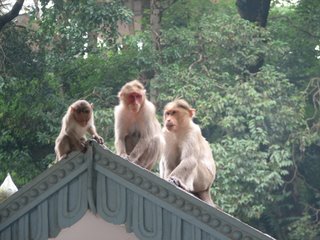
I have been living in a company provided guest house (within the company campus) far outside city perimeters, for the past two months. So outside my office work, it has been almost a complete social isolation, except some brief conversations I have with those people who serve me food at a nearby restaurant (the fact that they also belong to my place and are here for work, has helped significantly). Beyond this, my window to the society around me is the media through television and newspapers. That gives me ample time, opportunity and perhaps some authority ;) to comment critically about them (media), which can be noticed in few of my previous posts, this one, and perhaps some more to come.
One thing I am glad about the media is how careful, creative yet structured they are in presenting information to us, irrespective of quality of the subtance in it. The Times of India, on the top of their front page always publishes brief news topics in three categories - International, India, Sport. This morning's 'International' news reads "Furious at paparazzi, Denise tosses laptops from balcony", then leading us to page 13. Should I interpret that as the most important international news for today? or is it the most interesting? (you may know who she is, then you may as well decide yourself, how (un)important this news is). However, when you see it, what is clearly evident is the objective of this news showing up on the top corner of front page. It is not the news but a picture of Denise (picture is no where related to the incident) showing her cl***age. Buy The Times of India every morning, and they guarantee you a celebrity (never an Indian though) with you during every breakfast.
While they claim being the largest selling newspaper today, does this 'Times..' even know what investigative reporting is? Sometimes they perhaps think they do, when they publish statistics about increase in crime, or changing trends related to gender relationships among youth, or superficial reports on corruption and politics. (What sells most in today's movies - Sex, crime and superficial politics. That is also what sells newspapers you see.) But it may not take too many days for one to notice patterns in their news that show lack of depth in the content!
Last week front page reported the Pawar-Aussies incident with following heading "Push-n-shove: Pawar-play earns Aussies flak". While focussing on the creativity and rhetoric, they unfortunately failed to evaluate what the incident meant to this country and its people. The 'flak' did not come as any surprise, after an incident that perhaps should have resulted in more serious repercussion for the Aussies and their arrogance. But though 'The Times..' reported the incidents, they failed to convey their message if they had any, giving me an impression they did not have any stance on this incident. Though objectivity is a primary rule in news reporting, maturity should help the reporter represent and communicate a message when really needed.
But in all, its not only about a news paper, is it? If they aren't 'the' largest selling, they definitely are among the most selling newspapers. They have buyers. We pay to read them, and also the effort to sort out bits and pieces of news among heaps of advertisements. So does that say anything about us, the readers?
About us, the readers - that brings me to a little passage from an article written by RGK* -
"I will not say that cricket is a foolish game for there must be some virtue in a thing that is linked by so many people. For that matter, everyone says politics is a dirty game and everyone likes it. As a matter of fact cricket and politics are the two major spectacular sports in India. The only difference between the two is that cricket is more seriously taken than politics."
This was written by him over 25 years ago. The subject may have changed partially, but the thought still seems relevant. Doesn't it?
* RGK - R Gopal Krishna had a journalistic career spanning over 50 years and was on the staff of 'The Illustrated Weekly of India' for 28 years, before he retired as assistant editor in 1981.





